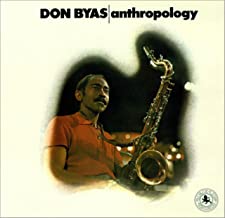
Requisites…
<Anthropology~Don Byas | By Eddie Carter
I begin this morning’s discussion with an album by tenor saxophonist Don Byas, a swing and bebop musician who played in the orchestras of Count Basie, Duke Ellington, and Lionel Hampton. He also worked with Art Blakey, Dizzy Gillespie, Bud Powell, and Ethel Waters among others. Anthropology (Black Lion Records BLP 30126) is a 1963 album that was recorded live at the Jazzhus Montmartre (also known as Café Montmartre). The rhythm section is an outstanding trio of Danish descent, pianist Bent Axen, bassist Niels-Henning Ørsted Pedersen and drummer William Schiöpffe. My copy used in this report is the US Stereo reissue (Black Lion BL-160), the date of release is unknown.
The album opens with Anthropology, a bebop classic written in 1945 by Dizzy Gillespie and Charlie Parker that’s also known as Thriving From a Riff or Thriving on a Riff. Schiöpffe introduces the tune, preceding the leader’s feisty delivery of the melody. Byas takes the lead with a compelling lift to start the soloing, then Axen executes the second reading efficiently. Pedersen turns in a brief presentation closely shadowed by Byas and Schiöpffe ends the readings by exchanging a few splendid phrases with the leader.
Moonlight In Vermont was written in 1944 by John Blackburn and Karl A. Suessdorf. This timeless evergreen provides a perfect backdrop for Byas’ gorgeous melody. The saxophonist continues with a very dreamy interpretation of the slow-paced, serene opening solo. Bent follows, displaying a graceful elegance on the next performance with discreet, perfectly tailored support by Niels-Henning and William. Byas’ closing chorus is lovingly rendered, completing the song with a tender finale that’s gorgeous.
Charlie Parker’s 1945 bebop anthem Billie’s Bounce ends the first side with a spirited rendition by the quartet. Pedersen and Schiöpffe open the song as a duet that becomes a lively theme treatment. Don raises the temperature on the lead solo with an effervescent beat that energizes the trio. Bent takes the spotlight last hitting a perfect groove on a swinging performance preceding the leader’s final remarks, theme’s reprise, and coda.
The gears shift upward for Dizzy Gillespie’s most famous recorded tune, Night In Tunisia was written in 1942 with Frank Paparelli. The rhythm section introduces the song at a speedy velocity proceeding to the aggressively energetic theme by Byas who also rips into the first solo voraciously. Bent takes the reins next zipping along like a whirlwind, then Don returns for a second exhilarating statement with bassist and drummer providing the fuel. NHØP takes over for an abbreviated scorcher, then Schiöpffe speaks last exhibiting mesmerizing brushwork into the invigorating climax.
The finale is the 1932 ballad, Don’t Blame Me, written by Jimmy McHugh and Dorothy Fields. This song made its first appearance on Broadway in the show, Clowns in Clover, and later in two films, The Bad and The Beautiful (1952) and Two Weeks in Another Town (1962). Byas begins with a delicate introduction and heart-warming melody ahead of a sultry first statement that’s exquisite. Axen expresses a gentle affection on the final solo preceding Byas who ends the song and LP with a tender sincerity.
In 1964, Byas was celebrating his third decade as a professional musician. In honor of that achievement, the LP was also released as The Big Sound – Don Byas’ 30th Anniversary Album on Fontana in the Netherlands and Debut Records in Denmark. Two songs on the original LP are omitted on Anthropology, There’ll Never Be Another You by Harry Warren and Mack Gordon and Walkin’ by Richard Carpenter. Don Byas was a masterful musician who was adept at a fast clip or on a romantic ballad.
He lived the last twenty-six years of his life in Europe, working extensively before passing away from lung cancer on August 24, 1972, at the age of fifty-nine. The dialogue between the quartet is fascinating and their music a treat for the Café Montmartre crowd. The album was produced by UK music executive Alan Bates who began Black Lion Records and also re-launched the Candid label in London. The sound quality is excellent, transporting the listener to the club amid the crowd. Though out of print for many years, Anthropology is a remarkable live album by Don Byas that I not only recommend but am sure will become a welcome addition in any library.
~ Alan Bates, The Big Sound – Don Byas’ 30th Anniversary Album (Debut Records DEB-142, Fontana 688 605 ZL) – Source: Discogs.com ~ Moonlight In Vermont, Night In Tunisia – JazzStandards.com ~ Don’t Blame Me – Source: Wikipedia.org © 2020 by Edward Thomas Carter
More Posts: choice,classic,collectible,collector,history,instrumental,jazz,music,saxophone


